Planning rules on extensions to be relaxed 'to boost economy'
- Published
- comments
Nick Clegg: "This is a big set of measures which will lead to more affordable homes"
The government wants to get planning officers "off people's backs" with a relaxation of current rules in England.
The government will consult on allowing people, for a three-year period, to build larger extensions on houses - up to 8m long for detached homes.
Rules on shops and offices expanding and on developments having to include affordable housing will be relaxed as ministers seek to boost the economy.
But Labour says that ministers are "kidding themselves".
The proposals, it says, are "not up to the scale of the challenge" and do not address the real problem of a "lack of confidence and demand in the economy".
Affordable homes
And the Local Government Association says it is a "myth" that the planning system was stopping house-building.
It released figures which show a backlog of 400,000 prospective homes which have planning permission but have not yet been built. It says these "conclusively prove" the planning system is not holding back development.
The coalition, which has undergone a reshuffle this week, is looking for ways to boost the economy and end the ongoing recession.
Prime Minister David Cameron and Deputy PM Nick Clegg have announced that 16,500 first-time buyers are to receive help getting on the housing ladder under an extension of the FirstBuy scheme.
Under this, would-be homeowners without a deposit are given an equity loan of up to 20% of the purchase price.
Just a few months ago the government rewrote the entire planning framework for England, after fierce initial resistance from countryside campaigners.
Now ministers want further changes to planning in England in an attempt to boost house-building and revive the economy.
The announcements come as the economy continues to languish, with the recession now having lasted more than nine months. The construction sector has performed particularly badly.
Mr Cameron said: "This government means business in delivering plans to help people build new homes and kick-start the economy.
"We're determined to cut through the bureaucracy that holds us back. That starts with getting the planners off our backs, getting behind the businesses that have the ambition to expand and meeting the aspirations of families that want to buy or improve a home."
He told ITV's Daybreak developers were being held back by the "many obligations" on them to build affordable housing.
Under the government's plans, if developers can prove these requirements make a site commercially unviable, the conditions will be removed.
There will be a one month consultation on allowing homeowners and businesses, for a three-year period, to be able to build much bigger extensions without planning permission than they can at present.
The new Permitted Development Rights would make it easier to install conservatories and loft extensions without going through weeks of planning bureaucracy.
If the plans go ahead, full planning permission - required for extensions of more than three or four metres from the rear wall of any home - would only be needed for those reaching beyond 8m for detached homes and 6m for others.
Rules that restrict an extension to no more than 50% of a property's garden will remain.
Communities Secretary Eric Pickles told the BBC that the extension rule changes would benefit local businesses as well as householders, as new carpets and furnishings would be needed for them.
Businesses would be able to expand shops by 100 square metres and industrial units by 200 square metres.
There will also be £300m of additional funding to provide up to 15,000 affordable homes and bring 5,000 empty homes back into use.
'Conservatories not an economic plan'
Speaking on BBC Breakfast, Nick Clegg said the government was putting forward a "big set of measures" to boost house-building but accepted some of the proposals would be controversial.
"We have a real crisis. We're not employing enough people in the construction sector. The construction sector has had a really hard time of it.
"We're not building enough homes. We're not building enough affordable homes. We've got to take some of these difficult decisions - yes, even with some controversy around them - to get Britain building."

The National Housing Federation, which represents England's housing associations, welcomed the package of measures as "a major step forward" with "the potential to transform the housing market".
"It will provide homes for some of the millions of families on waiting lists, create jobs and give the UK economy a shot in the arm with a speed and effectiveness few industries can match," the group said.
Meanwhile, Labour leader Ed Miliband and shadow chancellor Ed Balls launched an attack on the coalition's economic record and set out what they see as the start for a fundamental rethink about how a future Labour government would approach the economy.
As big a shift in thinking is needed now, Mr Miliband said, as happened after the second world war and in the late 1970s.
"Instead of a change of direction," Mr Miliband said "we get increasingly complex schemes and initiatives".
"Someone in New Labour said if you want to understand aspiration you need to understand conservatories. They were right about that.
"But a one-year holiday from the current rules on planning for a conservatory extension of up to eight metres into a garden which is what the government is announcing today, does not represent an economic plan."
- Published20 December 2012
- Published6 September 2012
- Published6 September 2012
- Published15 September 2011